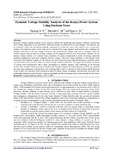Dynamic voltage stability analysis of the kenya power system using decision trees
Abstract
Dynamic Voltage stability analysis of any system is studied by considering load changes within the system and how voltage magnitudes at the load buses within the system are affected by the load changes. The analysis can be deepened further by considering probable contingencies within the system that could be line or generator outages. The dynamic nature of the load can be considered by using dynamic load models and evaluating the changes, with time, of the bus voltages. However, the model-driven voltages take time to compute which the system operator may not have as voltage collapse can be triggered within a very short period. Another way to analyse voltage stability is to consider many instances of system configuration in terms of varying loads and probable contingencies and then evaluating the bus voltages. This gives many snapshots of the dynamic load from which the dynamic tendency of the system can then be derived using artificial intelligence methods which can then build a time-sensitive model for online voltage stability estimation. This paper uses multiple iterations of system load configurations and a single contingency to simulate dynamic load conditions in the Kenyan system. The variables which are used to calculate the Voltage Collapse Proximity Indicator (VCPI) are captured for each load-contingency configuration. The resulting data is used to construct a Classification and Regression Trees (CART) for each bus which can then be used for online voltage estimation. The Decision Trees show the relationship between a particular bus’s voltage magnitude and the contingency and power demand at other buses
URI
http://hdl.handle.net/123456789/2778http://www.iosrjen.org/Papers/vol4_issue12(part-3)/C04120302024.pdf

